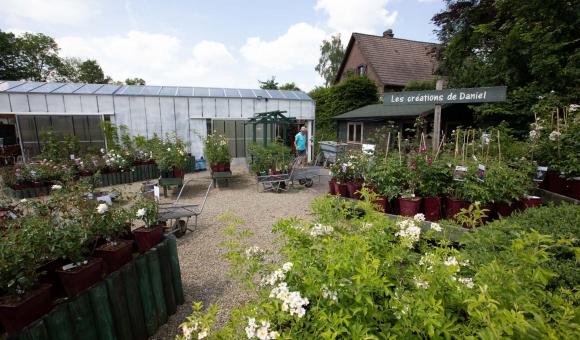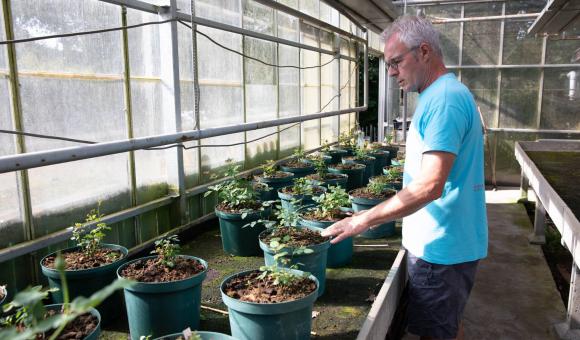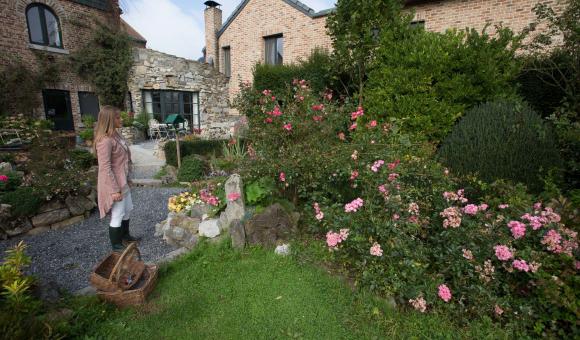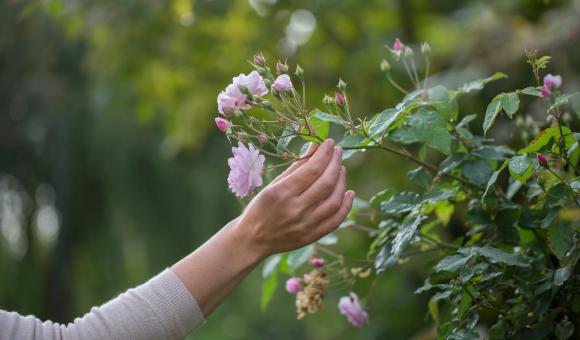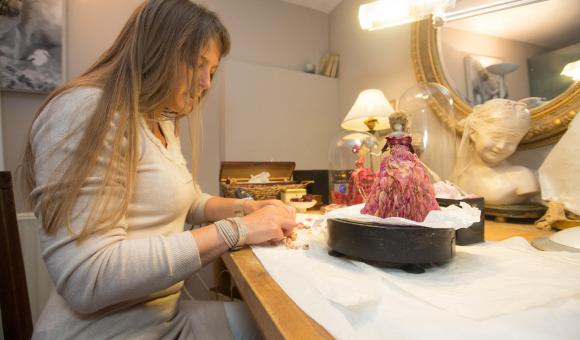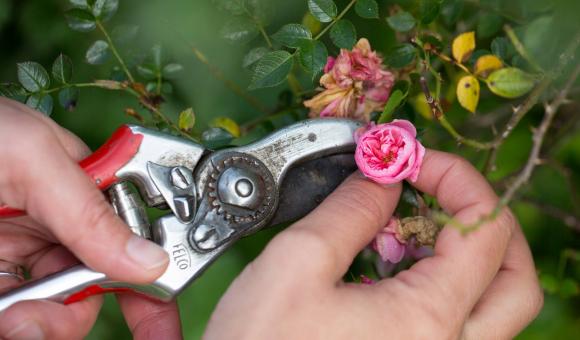
Our craftspeople: An unexpected expertise! Rose breeder and petal sculptor !
For some years now, I have been infatuated with beautiful and rare creations. That's because our regions are overflowing with unexpected talent, often with an international reputation. There they are, discreetly set up in their workshops: our craftspeople creating artistic wonders which will dazzle connoisseurs. My aim is to document them all. This photographic-based work has given rise to a website devoted entirely to exceptional handcrafted work.
My most recent article presents Daniel Schmitz and Alexia Franck. They are two unconditional rose lovers! Find the full article and additional images on my website www.lesmiroirsdelombre.com
Patrice Niset - July 2018.
It was the dolls of Alexia Franck which led me to Daniel Schmitz. Daniel grows, Alexia sculpts! Rose breeder? It is fair to say that I had no idea what this term meant. Rose grower is more obvious, but less poetic. Let's stick with the term breeder and try to understand how these two individuals ended up working with plants for our pleasure.
Daniel Schmitz: Roses from Times Past!
Everything started in Stavelot in the garden of Daniel's grandmother's farm. A vegetable garden, some fruit and two roses. With instructions not to enter this garden of Eden. Except that Daniel, as a good country boy, defied his grandmother and was forced to hide when she came out into the garden. The roses were the perfect screens, and crouching with his nose right next to them, he became acquainted with the intoxicating scent of the flowers. It was meant to be. Our olfactory memory is one of our most powerful senses. In his younger days, this Stavelot native was a postman, but never far away from a garden. Years later, Daniel tried planting roses, with great disappointment. Nothing happened, there was no emotion. "Industrial" roses are bland and have no character. It was only later in England, in the middle of an English garden, that the magic happened.
"I caught the scent of something, followed its trace and was led to a row of roses that took me back to my childhood". It was these first purchases that set the scene for his future as a horticulturist. Each rose bought in England was resold in Belgium to finance the next ones, thereby starting the current rose garden. Out of a small acorn grew a large oak.
"I read the book 'Parfum' by Patrick Süskind four times in a row. This novel is about the amazing story of Jean-Baptiste Grenouille, who had an incredible sense of smell. His adventures took place in France in the 18th century. I have my roses because of 'Parfum'. After years of research, I found the two roses from my childhood: Charles de Mills & a Rugosa rose. The palette of scents is much broader than the variety of shapes.
And about thirty years later, Daniel Schmitz is now THE rose specialist in the kingdom. Not content with mastering his knowledge of roses, he decided to create one.
LMdO: Tell us about your career as a rose breeder..
Daniel Schmitz : At a convention in Lyon in the 2000s, an American breeder was giving a speech and gave this simple piece of advice, which struck a chord with me: "Breeders, relearn how to let nature take its course". All rose breeders take pollen from the father and place it on the pistil of the mother, note down all these crossbreeds, and then wait patiently for results, which may or may not be interesting. Their main work tool is a simple pair of scissors, which help them collect pollen. This rather scientific method did not appeal to me. So I applied the American breeder's advice. In my nursery, the roses are planted close to each other, and I let the insects do the pollination work. As such, my work is not very intrusive for the plants, and to be honest, it is quite "invisible". Besides, I started off low-key. No-one knew I was hidden away in a corner with those first few roses germinating.
LMdO: And that's how "Belle des Fagnes" saw the light of day?
DS: That is a rather brief summary, but correct, I launched my first marketable rose in 1984. I was quite lucky, since the development process was fast. Spurred on by this, I started to work on several projects at the same time, but nature brought me back down to earth by taking back its rights: the frosts destroyed 6 to 7 years of work and research. After this shock, I guessed it was meant to be, and not without significance. And indeed, the now empty space in the greenhouse would lead me to an Australian who was to turn my life and my greenhouse upside down...
LMdO: The famous Warren Millington?
DS: They call him 'The Magician'. I have 150 varieties of his at the nursery. He has revolutionised the world of roses, like Austin did in the 1960s. His creative ability amazes the entire profession. I have created about a dozen varieties myself, while he has created 150. It's quite simply astonishing, especially given that he doesn't sacrifice anything on the altar of productivity. His creations are of exceptional quality and variety. The power of their scents is as impressive as their finesse, it is a veritable tour de force. I am both admiring of and grateful for his work.
LMdO: And you ended up going back to rose breeding, under Warren's encouragement?
DS: This year, I will present a new rose, a baby that doesn't yet have a name. It is my 15th! After countless observations, I validate the new sellable roses, they need to be strong, resilient, fragrant, and pretty to the eye. It's only after several years of testing and production that you can be sure of your baby. This takes 5 to 7 years in general. I observe certain roses in bloom with other neighbouring roses. I imagine that my bees or drones will go from one rose to another and help nature to create crossbreeds which I hope will be interesting. I mark the flower, harvest the seed and then freeze it. In spring, I put them in pots to start germination. After that, it's just observation and quite a bit of luck. When the development process is completed, I propagate the plants by simply grafting them. You search by the seed and propagate by grafts.
LMdO: How much of your expertise is involved in the process of creating a rose?
DS: Not much. Firstly, I can guide the shape of the shrub or the climber, secondly, it will be the shape and size of the flower, and in third position is the hue. As for the scent, that's almost impossible to predict.
LMdO: You insist on the term Roses from Times Past, were things better in the old days?
DS: Industrial roses intended for sale as cut flowers are like the living dead. They are grown for their long stem, their flower and a little for their perfume. All with a lot of pesticides. Their future is already behind them. These roses are not meant to end up in gardens. With me, roses are promised a specific future. I watch over a heritage which is constantly evolving. Breeders create a thing of beauty, something living, not speculation. Like everyone else, we need to protect ourselves against diseases and insects. I only work with natural products, without chemicals. My recipe is based on milk, essential oils and homeopathy.
LMdO: Do you still need to give the most recent rose a name?
DS: A lot of roses have been named after a famous person or prestigious place. That doesn't reflect their essence. The names I give them are directly suggested to me by the roses themselves. I wait until they speak to me before choosing a name. We are not always synchronised because I still haven't heard anything from my most recent creation regarding its name. I have to clear my head to get into the right frame of mind. For example, "Doux Coeur" (Soft heart) was an obvious choice, given how calming this rose is for me. When you are close to nature, it is actually easy to listen to it.
Daniel Schmitz's creations: Jacques Cartier - Légère Surprise - Pure Liberté - Doux Secret - Jardins d'Aywiers - Délicieuse Gourmandise - Elégante Danseuse - Joyeuse Farandole - Jolie Dentelle - Eglantine des Fagnes - Belle des Fagnes - Mme Christiane Jacquet.
Alexia Franck: the dolls of the Blush Noisette workshop!
Alexia has never been far from roses. Her father grew them for decades, and she has only ever known extraordinarily flowery gardens. It was when she left home that she realised something was missing in her day-to-day life. It didn't take long for roses to come back into her life. Having to spend long hours in the painting studio, she finds herself enjoying working the soil of her garden, no bigger than a pocket handkerchief, next to her studio. She likes to see it come into bloom. Standing in front of her roses, she is delighted to see them in bloom for months on end. Starting out as an animal portraitist, boredom linked to the repetitive nature of the work prompted her to give it up. She turned her attention to painting furniture. Hunting, finding, restoring, creating, these are what drives her creativity. Her workshop already takes its name from the world of roses: la Blush Noisette!
As a young designer and mother, Alexia devises creative workshops for her daughter and her friends. It goes without saying that she collects rose petals in the garden, then dries them to use as a raw material during the children's craft workshops. This is where all the strands come together: Alexia's artistic world combines three passions: roses, collectible dolls and the poetic and extravagant fashion that characterised the 18th century. It goes without saying that she collects rose petals in the garden, then dries them to use as a raw material. The first doll that Alexia created was made of paper, onto which she simply glued dried petals, without any special technique or preparation.
What seemed like a good idea was nothing of the sort in terms of technique. Flower arranging, the art of drying, she had to learn everything from scratch. She released her first doll a few weeks later, but its fragility and lack of technique were a good reason to keep going. Passion did the rest. Taking care of the garden and working on the technique of the dolls came to occupy a central place in Alexia's life over the next few months.
Alexia Franck: The world of roses is so unique. I have thought about using other petals, but to be honest, there is such variety, such poetry in roses that I don't think I will ever change them. My father passed on his passion to me, but I needed time away to realise, and above all a garden, for this passion to blossom. In fact they are kind of part of me.
LMdO: A person's life is like a rose: in the morning it blooms and in the evening it withers. Do you practise an ephemeral art form?
AF: This was definitely the case in the beginning, but I am improving my conservation techniques. I also use roses which have undergone other drying treatments to preserve them, which are specific to professional flower arrangers, but I do not have the diversity of colours which my art requires. So I love growing roses, my garden is a veritable experimental laboratory, to select the most resistant colours over time. I am passionate about all the research and selecting. As for drying techniques, I still have a few tricks up my sleeve ... Right now, my technique works: the colours hold well, the petals remain in place. That's encouraging. Moreover, it is the rather paradoxical side of my art. I have to cut the roses quickly to use them, which is a crime of lèse majesté for purists. It is always a bit of a game of influence between me and my father. At first we didn't understand each other very well, but now the relationship is clearly complementary. He has passed on his passion for roses to me, I express it in a different way. It's my way of paying tribute to him for all the beautiful things he has given us.
LMdO: 40 hours of work per doll, are you anxious about letting them go?
AF: It's all in my head, I don't make any preliminary sketches. I am a dressmaker, sculptor, botanist... My characters are a part of me, and I don't like to see them leave my world too fast. So I photograph them from all angles to keep as many memories as possible. It's also a way to document my work. My customers are all rose lovers, both women and men in fact. My dolls are requested for weddings, curiosity cabinets and also for the simple pleasure of being looked at. The way children look at the dolls is also touching: my dolls are obviously very popular with little girls, but little boys are also surprised and show an interest. They obviously aren't toys, but rather carriers of dreams and happiness.
Les Roses de Daniel: Website
